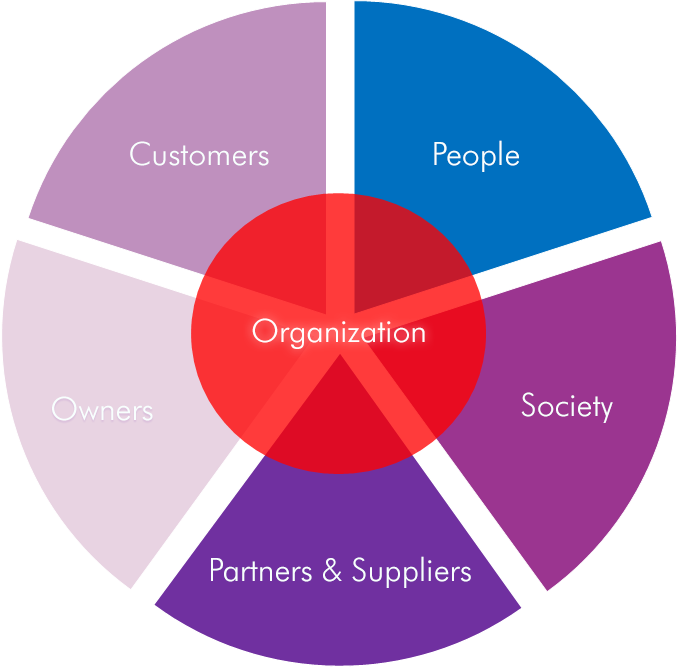The Excellence Manifesto
ensure the best possible results for all involved
Management-as-usual
Management-as-usual is the enemy of excellence. It promotes mediocrity. Instead of holistically managing an organization to achieve the best possible outcomes for all stakeholders, it takes a fragmented approach, focuses on short-term gains, and frequently ignores some stakeholders in favour of others. It is prepared to sell out future generations.
- A focus on cost rather than value
- Treatment of staff as if they were commodities
- Functional silos
- Poor internal communication
- Lack of concern for the environment
Satisfactory Underperformance
Satisfactory underperformance – a term coined by the late Sumantra Ghoshal, who was a colleague and collaborator of Excellence Hall of Fame member Henry Mintzberg – is an insidious affliction for many organizations.
It is caused by tolerance of performance that is deemed “satisfactory” but which is lower than what the organization is capable of delivering.
When an organization has greater capability than ambition the culture gets damaged. Initiatives are seen as foolhardy risks and people avoid making decisions as doing so exposes them. Compliance and fear replace enthusiasm and passion. Work ceases to be fun and, eventually, the organization stagnates.
Excellence
.jpg)
Excellence requires ambition. It requires us to ask more of ourselves than others do and to work not merely to be the best but to be the best that we can be.
Business Excellence, in contrast to management-as-usual, requires a holistic, integrated approach to management that balances the long term and the short term and which considers the needs of all stakeholders. Irrespective of sector, it is the best way to run an organization.
Stakeholders

- Customers
- People
- Owners (known as shareholders in many cases)
- Partners & suppliers
- Society
As the fundamental principle of excellence is to seek to achieve win-win outcomes and ensure the best possible outcomes for all involved, excellent organizations pursue strategies that seek to benefit all of these stakeholder groups as much as possible and do not weight the needs of any stakeholder group at zero.
The Excellence Manifesto
We, the undersigned, are declaring war on mediocrity.
We hold that the fundamental principle of business excellence is that all stakeholders must benefit – all of an organization’s dealings must ensure the best possible outcome for all involved with no stakeholder’s needs being ignored.
We hold that management-as-usual promotes mediocrity. It is fragmented, siloed, focused on short-term gains and is prepared to sell out future generations. Management-as-usual is the enemy of excellence. It typically ignores the ecosystem that the organization is part of and produces “satisfactory underperformance”, tolerance of which results in under-achievement, sub-optimal results for stakeholders, and ultimately failure.
We hold that compliance with standards and legislation is the minimum stakeholders expect and that in the long term, merely focusing on them is to abdicate an organization’s responsibility, encouraging a culture of conformity which can lead to mediocrity and risk the organization’s future.
We hold that all organizations – irrespective of sector – should strive for excellence as this is the best way to run an organization since excellent organizations are managed holistically and consistently out-perform their peers in delivering positive results for all stakeholders.
We, therefore, call on all organizations around the globe to embark on the journey to excellence.
Achieving excellence for any organization from a small company to a government is a major challenge and it cannot be accomplished in isolation. It requires us to ask more of ourselves than others do. It requires us to work not merely to be “the best” but to be the best that we can be. Anything less than authentic commitment falls short and will result in mediocrity and underperformance.
Excellence demands that we care for the people working in our organizations, our partners and suppliers, our impact on society, and on the world at large. It requires us – for the good of the organization and its stakeholders – to contribute actively to make the world a better place and to put the long-term benefit of stakeholders ahead of short-term gain.
The journey will have difficulties but any organization can achieve excellence and the more that do so the better for everyone. It needs vision, drive, and persistence to overcome the challenges but the rewards are worth it. It takes the courage to do things differently, to dream the dream and make that dream a reality.
We choose to strive for excellence because it is the right thing to do and because it will yield long-term benefit for all our stakeholders. We invite you to join us.